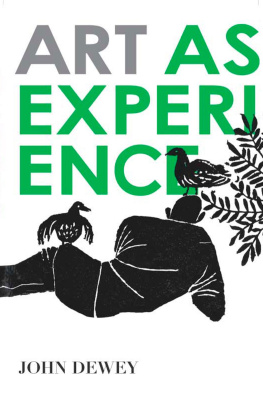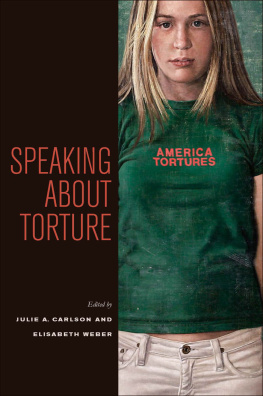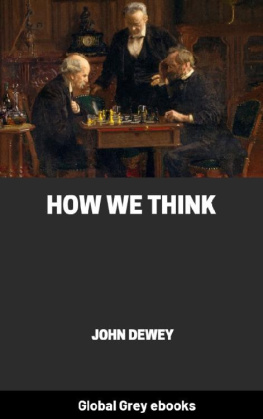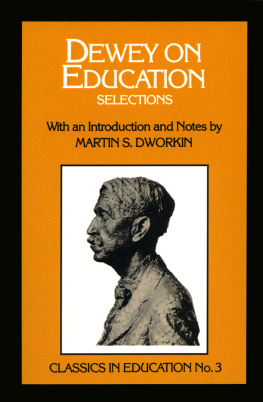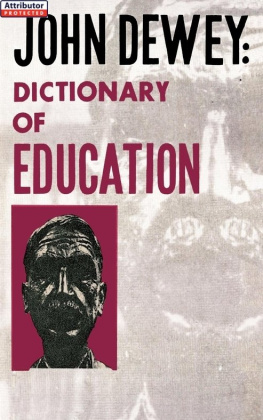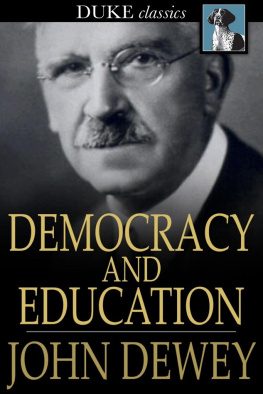Dewey John - Democracy and Education
Here you can read online Dewey John - Democracy and Education full text of the book (entire story) in english for free. Download pdf and epub, get meaning, cover and reviews about this ebook. genre: Science. Description of the work, (preface) as well as reviews are available. Best literature library LitArk.com created for fans of good reading and offers a wide selection of genres:
Romance novel
Science fiction
Adventure
Detective
Science
History
Home and family
Prose
Art
Politics
Computer
Non-fiction
Religion
Business
Children
Humor
Choose a favorite category and find really read worthwhile books. Enjoy immersion in the world of imagination, feel the emotions of the characters or learn something new for yourself, make an fascinating discovery.
- Book:Democracy and Education
- Author:
- Genre:
- Rating:5 / 5
- Favourites:Add to favourites
- Your mark:
- 100
- 1
- 2
- 3
- 4
- 5
Democracy and Education: summary, description and annotation
We offer to read an annotation, description, summary or preface (depends on what the author of the book "Democracy and Education" wrote himself). If you haven't found the necessary information about the book — write in the comments, we will try to find it.
Democracy and Education — read online for free the complete book (whole text) full work
Below is the text of the book, divided by pages. System saving the place of the last page read, allows you to conveniently read the book "Democracy and Education" online for free, without having to search again every time where you left off. Put a bookmark, and you can go to the page where you finished reading at any time.
Font size:
Interval:
Bookmark:
The Project Gutenberg EBook of Democracy and Education, by John Dewey
This eBook is for the use of anyone anywhere at no cost and with
almost no restrictions whatsoever. You may copy it, give it away or
re-use it under the terms of the Project Gutenberg License included
with this eBook or online at www.gutenberg.org
Title: Democracy and Education
Author: John Dewey
Release Date: July 26, 2008 [EBook #852]
Language: English
*** START OF THIS PROJECT GUTENBERG EBOOK DEMOCRACY AND EDUCATION ***
Produced by David Reed, and David Widger
I have tried to make this the most accurate text possible but I am sure that there are still mistakes.
I would like to dedicate this etext to my mother who was a elementary school teacher for more years than I can remember. Thanks.
David Reed
Chapter One: Education as a Necessity of Life Summary. It is the very nature of life to strive to continue in being. Chapter Two: Education as a Social Function Summary. The development within the young of the attitudes Chapter Three: Education as Direction Summary. The natural or native impulses of the young do not agree Chapter Four: Education as Growth Summary. Power to grow depends upon need for others and plasticity. Chapter Five: Preparation, Unfolding, and Formal Discipline Summary. The conception that the result of the educative process Chapter Six: Education as Conservative and Progressive Summary. Education may be conceived either retrospectively Chapter Seven: The Democratic Conception in Education Summary. Since education is a social process, and there are many kinds Chapter Eight: Aims in Education Summary. An aim denotes the result of any natural process Chapter Nine: Natural Development and Social Efficiency as Aims Summary. General or comprehensive aims are points of view for surveying Chapter Ten: Interest and Discipline Summary. Interest and discipline are correlative aspects of activity Chapter Eleven: Experience and Thinking Summary. In determining the place of thinking Chapter Twelve: Thinking in Education Summary. Processes of instruction are unified in the degree Chapter Thirteen: The Nature of Method Summary. Method is a statement of the way the subject matter Chapter Fourteen: The Nature of Subject Matter Summary. The subject matter of education consists primarily Chapter Fifteen: Play and Work in the Curriculum Summary. In the previous chapter we found that the primary subject Chapter Sixteen: The Significance of Geography and History Summary. It is the nature of an experience to have implications Chapter Seventeen: Science in the Course of Study Summary. Science represents the fruition of the cognitive factors Chapter Eighteen: Educational Values Summary. Fundamentally, the elements involved in a discussion of value Chapter Nineteen: Labor and Leisure Summary. Of the segregations of educational values Chapter Twenty: Intellectual and Practical Studies Summary. The Greeks were induced to philosophize Chapter Twenty-one: Physical and Social Studies: Naturalism and Humanism Summary. The philosophic dualism between man and nature is reflected Chapter Twenty-two: The Individual and the World Summary. True individualism is a product of the relaxation of the grip Chapter Twenty-Three: Vocational Aspects of Education Summary. A vocation signifies any form of continuous activity Chapter Twenty-four: Philosophy of Education Summary. After a review designed to bring out the philosophic issues Chapter Twenty-five: Theories of Knowledge Summary. Such social divisions as interfere with free and full Chapter Twenty-six: Theories of Morals Summary. The most important problem of moral education in the school |
1. Renewal of Life by Transmission. The most notable distinction between living and inanimate things is that the former maintain themselves by renewal. A stone when struck resists. If its resistance is greater than the force of the blow struck, it remains outwardly unchanged. Otherwise, it is shattered into smaller bits. Never does the stone attempt to react in such a way that it may maintain itself against the blow, much less so as to render the blow a contributing factor to its own continued action. While the living thing may easily be crushed by superior force, it none the less tries to turn the energies which act upon it into means of its own further existence. If it cannot do so, it does not just split into smaller pieces (at least in the higher forms of life), but loses its identity as a living thing.
As long as it endures, it struggles to use surrounding energies in its own behalf. It uses light, air, moisture, and the material of soil. To say that it uses them is to say that it turns them into means of its own conservation. As long as it is growing, the energy it expends in thus turning the environment to account is more than compensated for by the return it gets: it grows. Understanding the word "control" in this sense, it may be said that a living being is one that subjugates and controls for its own continued activity the energies that would otherwise use it up. Life is a self-renewing process through action upon the environment.
In all the higher forms this process cannot be kept up indefinitely. After a while they succumb; they die. The creature is not equal to the task of indefinite self-renewal. But continuity of the life process is not dependent upon the prolongation of the existence of any one individual. Reproduction of other forms of life goes on in continuous sequence. And though, as the geological record shows, not merely individuals but also species die out, the life process continues in increasingly complex forms. As some species die out, forms better adapted to utilize the obstacles against which they struggled in vain come into being. Continuity of life means continual readaptation of the environment to the needs of living organisms.
We have been speaking of life in its lowest termsas a physical thing. But we use the word "Life" to denote the whole range of experience, individual and racial. When we see a book called the Life of Lincoln we do not expect to find within its covers a treatise on physiology. We look for an account of social antecedents; a description of early surroundings, of the conditions and occupation of the family; of the chief episodes in the development of character; of signal struggles and achievements; of the individual's hopes, tastes, joys and sufferings. In precisely similar fashion we speak of the life of a savage tribe, of the Athenian people, of the American nation. "Life" covers customs, institutions, beliefs, victories and defeats, recreations and occupations.
We employ the word "experience" in the same pregnant sense. And to it, as well as to life in the bare physiological sense, the principle of continuity through renewal applies. With the renewal of physical existence goes, in the case of human beings, the recreation of beliefs, ideals, hopes, happiness, misery, and practices. The continuity of any experience, through renewing of the social group, is a literal fact. Education, in its broadest sense, is the means of this social continuity of life. Every one of the constituent elements of a social group, in a modern city as in a savage tribe, is born immature, helpless, without language, beliefs, ideas, or social standards. Each individual, each unit who is the carrier of the life-experience of his group, in time passes away. Yet the life of the group goes on.
Font size:
Interval:
Bookmark:
Similar books «Democracy and Education»
Look at similar books to Democracy and Education. We have selected literature similar in name and meaning in the hope of providing readers with more options to find new, interesting, not yet read works.
Discussion, reviews of the book Democracy and Education and just readers' own opinions. Leave your comments, write what you think about the work, its meaning or the main characters. Specify what exactly you liked and what you didn't like, and why you think so.




